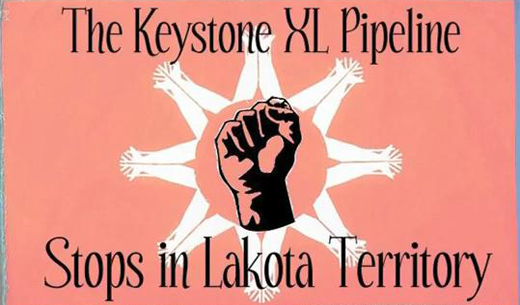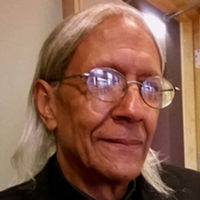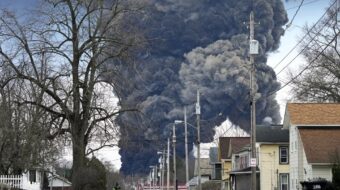
The Oglala Lakota and activists of the American Indian Movement have taken a vow that the only way the KXL Pipeline will pass through South Dakota is if they are dead or in prison. This vow was taken back on Feb. 27, Liberation Day, an event to commemorate the infamous 1890 massacre of Native people by U.S. soldiers.
A four-directions walk is held each year which ends at Wounded Knee to honor the murdered innocents and the Lakotas’ honored and continued history of resistance.
This year’s commemoration was to face a new threat in the form of the Keystone XL Pipeline. The Oglala Lakota Nation is actively organizing to oppose the construction of the pipeline. The 1,700 mile-long pipeline would transport a whopping 830,000 barrels of crude oil daily from western Canada through South Dakota and points south before emptying its toxic product in refineries on the Texas coast. These oil pipelines have a history of disastrous leaks.
The proposed Keystone Pipeline would cross at two points with a pipeline that is the main water source for the Oglala Lakota Pine Ridge Reservation and also for the neighboring Sicangu Rosebud Reservation.
The first Keystone Pipeline which stretches from Alberta, western Canada, to Illinois spilled 12 times in just its first year of operation. The company that constructs the pipelines, TransCanada, had predicted that its pipelines would only sustain spills once every seven years. Quite, frankly, any spill is too much. The Lakota, in conjunction other native nations along the proposed pipeline route have sworn to engage in direct action to halt the heinous pipeline of death.
The native nations of the Dakotas have already seen the deadly effects of the “pipelines of death” on the native communities of western Canada. A frightening example, is Fort McMurray, a First Nations reserve in northern Alberta, Canada whose health is being destroyed as the meat from the bush is now contaminated. Also, arsenic levels, resulting from the pipelines in the Fort McMurray communities are 453 times above the acceptable risk level.
In Fort Chipewyan, Alberta and other Native reserves, cholangiocarcinoma, a very rare form of cancer of the bile duct is now appearing. Also, appearing are colorectal and gastrointestinal cancers.
In January, 2010 there was a 3,000 gallon spill of Alberta tar sands oil near Pembina, North Dakota. As is so often the case with these spills , there is still no official report on the cause of the spill. Pipelines usually weaken at the weld points and there are many such points on the tar sands pipelines.
Tar sands are ecologically considered the most destructive oil production projects on earth.
Everything about the tar sands pipelines is considered inimical to human existence. For example, one barrel of tar sands oil requires between 2 and 4.5 barrels of water and produces two barrels of toxic waste and one barrel of oil. That water becomes mixed with toxic sludge and is stored in huge tailings ponds many of which can be seen even from space with the naked eye. Canadian tar sands is licensed to use more water than Alberta’s two major cities, Calgary and Edmonton combined.
Reportedly, in the U.S., a final decision on the pipeline is due to be made by President Obama sometime in 2014. Native nations are prepared to give their all to stop the project, while hoping that the president will not approve the deadly pipeline.
The Lakota are also working with other tribes in organizing Moccasins on the Ground, a direct action movement to prepare people for massive actions if Keystone receives approval. Many have already received training in opposition tactics.
All things considered, it is small wonder that the Lakota are willing to risk death or imprisonment to stop Keystone.
Photo: Popular Resistance












Comments